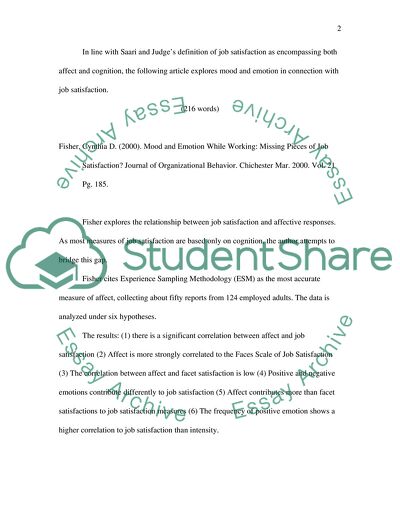
- Home
- Free Samples
- Premium Essays
- Editing Services
- Extra Tools
- Essay Writing Help
- About Us
- Studentshare
- Subjects
- Miscellaneous
- Annotated Review
Annotated Review - Essay Example

- Subject: Miscellaneous
- Type: Essay
- Level: Ph.D.
- Pages: 4 (1000 words)
- Downloads: 0
- Author: gutmanndouglas
Extract of sample "Annotated Review"
(3) the methods of measuring and influencing job satisfaction, where the authors advocate using employee attitude surveys. The authors conclude that HR practitioners can close the knowledge gaps by keeping abreast of research findings, mastering basic statistical skills, applying ROI principles and using employee attitude surveys as guidelines for employee job satisfaction. The results: (1) there is a significant correlation between affect and job satisfaction (2) Affect is more strongly correlated to the Faces Scale of Job Satisfaction (3) The correlation between affect and facet satisfaction is low (4) Positive and negative emotions contribute differently to job satisfaction (5) Affect contributes more than facet satisfactions to job satisfaction measures (6) The frequency of positive emotion shows a higher correlation to job satisfaction than intensity.
The authors conclude a modest correlation between affect and job satisfaction, suggesting that affect and cognition contribute individually to overall evaluative judgment of job satisfaction. Improving affect at work will influence cognitive behavior and overall job satisfaction. Chen investigates the relationship between Service Orientation, Job Satisfaction and Organizational Behavior in the International Tourist Hotel industry. This study could facilitate the success of contemporary corporations, which are increasingly customer-oriented.
The author uses a questionnaire survey of employees with a minimum of one years’ service in Taiwan’s international tourist hotels. 350 responses are collected and analyzed through Linear Structural Relationships under four hypotheses. Results show that (1) Service orientation is positively correlated with job satisfaction (2) Service orientation is positively correlated with organizational commitment (3) Job satisfaction is positively correlated with organizational commitment (4) Service orientation is positively correlated with organizational commitment,
...Download file to see next pages Read MoreCHECK THESE SAMPLES OF Annotated Review
Annotated Bibliography
Locating Topics of Interests in Peer-Reviewed Journals
Review of Literature- Annotated Bibliography
Media Studies Dissertation Plan
Annotated Reference List
Online Library
Revised Annotated bibliography
The Cask of Amontillado

- TERMS & CONDITIONS
- PRIVACY POLICY
- COOKIES POLICY